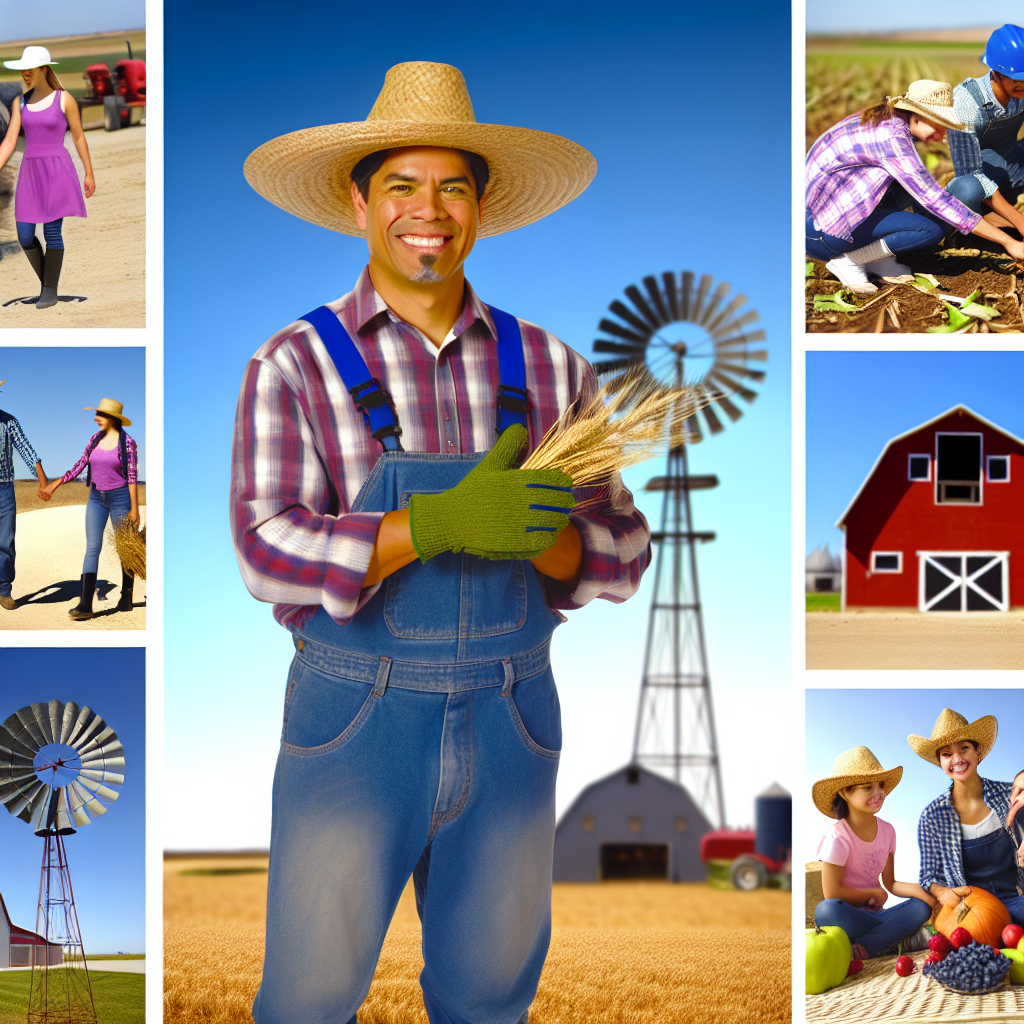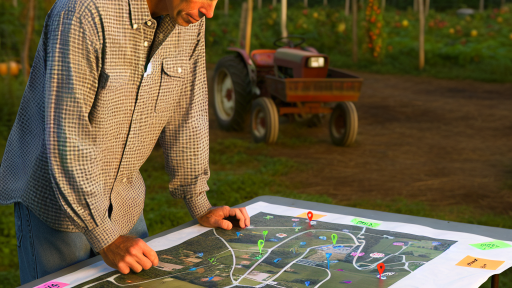Introduction to Sustainable Farming and Its Importance
Understanding Sustainable Practices
Sustainable farming focuses on environmentally friendly practices.
This approach minimizes the use of harmful chemicals.
It encourages natural methods for pest control and soil management.
Additionally, sustainable farming supports biodiversity restoration.
Moreover, it reduces the carbon footprint associated with agriculture.
The Role of Agri-Tourism
Agri-tourism promotes sustainable farming by connecting consumers and producers.
This practice encourages visitors to learn about farming methods.
It helps create awareness of the importance of sustainable practices.
Through agri-tourism, farms become educational centers for the public.
Visitors gain insight into food production and environmental stewardship.
Economic Benefits
Sustainable farming practices lead to long-term economic benefits.
Farmers can diversify their income through agri-tourism activities.
This diversification enhances the resilience of the farming business.
Additionally, it fosters community involvement and support.
Visitors often purchase local products, boosting farm revenue.
Transform Your Agribusiness
Unlock your farm's potential with expert advice tailored to your needs. Get actionable steps that drive real results.
Get StartedCommunity and Environmental Impact
Sustainable farming strengthens rural communities through agri-tourism.
It creates jobs and encourages local entrepreneurship.
Furthermore, it improves the local ecosystem by promoting conservation efforts.
Farmers implement practices that enhance water quality and soil health.
Consequently, sustainable farming has a positive ripple effect on the environment.
Overview of Agri-Tourism and Its Role in Sustainable Agriculture
Defining Agri-Tourism
Agri-tourism combines agricultural activities with tourism.
It invites visitors to experience farm life and education.
This sector supports farmers by providing additional income.
Moreover, it promotes awareness of sustainable practices.
Benefits of Agri-Tourism
Agri-tourism offers various benefits to local economies.
It creates jobs and boosts communities by attracting visitors.
This influx increases demand for local products.
Additionally, it helps preserve traditional farming methods.
Connection to Sustainable Practices
Agri-tourism encourages sustainable agricultural practices.
Farmers can showcase organic methods and conservation techniques.
Visitors learn about eco-friendly farming, fostering greater awareness.
Hence, it promotes a deeper connection between consumers and producers.
Encouraging Environmental Stewardship
Agri-tourism plays a role in environmental stewardship.
Farmers use these platforms to advocate for sustainability.
They often implement practices that reduce carbon footprints.
Educating visitors about resource conservation is vital.
Challenges and Opportunities
While beneficial, agri-tourism also faces challenges.
Competition from other tourist attractions can be tough.
However, it offers opportunities for innovation in marketing.
Showcase Your Farming Business
Publish your professional farming services profile on our blog for a one-time fee of $200 and reach a dedicated audience of farmers and agribusiness owners.
Publish Your ProfileBy embracing technology, farms can reach wider audiences.
Case Studies of Successful Agri-Tourism Ventures
Many farms have successfully integrated agri-tourism.
For instance, Green Valley Farm hosts seasonal events.
These activities attract thousands, promoting local produce.
Similarly, Sunny Acres educates visitors about organic farming.
Economic Benefits of Integrating Agri-Tourism in Farming Practices
Boosting Farm Revenue
Integrating agri-tourism can significantly boost farm revenue.
Farmers can diversify their income streams by attracting visitors.
These visitors often spend money on farm-related activities and products.
Agri-tourism creates additional opportunities for value-added products.
For instance, selling homemade goods can lead to increased profits.
Creating Jobs and Supporting Local Economy
Agri-tourism generates job opportunities in rural areas.
It requires staff for guiding tours, managing events, and planning activities.
Consequently, this influx of jobs enhances the local economy.
Moreover, local suppliers benefit from the increased demand for goods and services.
As a result, agri-tourism can foster economic resilience in communities.
Enhancing Market Reach and Visibility
Agri-tourism practices can enhance a farm’s market reach.
By hosting events, farms gain visibility among potential customers.
This exposure can lead to long-term customer relationships.
Social media plays a critical role in marketing agri-tourism initiatives.
Farmers can showcase their offerings and attract a broader audience online.
Encouraging Sustainable Practices
Agri-tourism promotes the adoption of sustainable farming practices.
Visitors often seek out eco-friendly experiences when they travel.
This demand encourages farmers to implement better environmental practices.
In turn, sustainable farming leads to improved soil health and biodiversity.
Such practices can ultimately enhance farm productivity and profitability.
You Might Also Like: Integrating Livestock In Sustainable Farming Systems
Environmental Impacts of Agri-Tourism Promoting Sustainable Farming Methods
Enhancing Awareness
Agri-tourism raises awareness about sustainable farming practices.
Visitors experience the benefits firsthand, fostering a connection to the land.
This connection cultivates a deeper understanding of farming challenges.
Supporting Local Economies
Agri-tourism provides additional income for local farmers.
By diversifying income sources, farms can invest in sustainable practices.
Moreover, this revenue helps maintain rural economies.
Promoting Biodiversity
Agri-tourism encourages practices that enhance biodiversity.
Farmers adopt methods that protect local flora and fauna.
Visitors often engage in activities that support ecological health.
Reducing Carbon Footprint
Agri-tourism can help reduce the carbon footprint of farming operations.
Farmers often use eco-friendly practices to attract tourists.
These practices can include organic farming and renewable energy sources.
Encouraging Conservation Efforts
Through agri-tourism, farmers are motivated to implement conservation strategies.
Visitors are educated on the importance of preserving natural resources.
Showcase Your Farming Business
Publish your professional farming services profile on our blog for a one-time fee of $200 and reach a dedicated audience of farmers and agribusiness owners.
Publish Your ProfileAs a result, there’s greater community support for sustainable practices.
Creating Educational Opportunities
Agri-tourism offers workshops and tours focused on sustainable farming.
Participants learn about organic methods, composting, and land management.
This education can inspire future generations of environmentally conscious farmers.
Improving Soil Health
Many agri-tourism operations emphasize soil health.
Practices include crop rotation and cover cropping to enhance soil quality.
Healthy soil leads to better crop yields and less chemical dependence.
You Might Also Like: Building Brand Loyalty in Direct Farm Sales
Community Engagement and the Social Aspects of Agri-Tourism
Creating Connections
Agri-tourism fosters connections between farmers and visitors.
This interaction builds relationships based on trust and transparency.
Visitors learn about farming practices firsthand.
Consequently, they gain a deeper appreciation for local food systems.
Promoting Local Culture
Agri-tourism highlights unique aspects of local culture.
Farmers often share traditional culinary practices with guests.
This exchange enriches the visitor experience significantly.
Moreover, it helps preserve local heritage and customs.
Economic Benefits
Community engagement through agri-tourism stimulates local economies.
Local businesses often benefit from increased foot traffic.
Farmers gain additional income from tours and events.
As a result, this model enhances overall community well-being.
Education and Awareness
Agri-tourism serves as a platform for education.
Workshops and tours provide information on sustainable practices.
Visitors become more aware of environmental issues.
This awareness can lead to more responsible consumer behavior.
Building Community Resilience
Engaging the community strengthens resilience against economic shocks.
Shared experiences create a sense of belonging and ownership.
Community events foster collaboration and support among residents.
Such bonds can lead to innovative solutions for local challenges.
Learn More: Farm-to-School Success Stories for Farmers

Case Studies of Successful Sustainable Farming Through Agri-Tourism
Sunny Acres Farm
Sunny Acres Farm integrates agri-tourism to promote sustainable practices.
This farm offers engaging tours of their organic vegetable gardens.
Visitors learn about crop rotation and natural pest management techniques.
They also provide workshops on sustainable living and cooking classes.
This approach enhances community awareness and support for sustainable farming.
Green Valley Orchards
Green Valley Orchards focuses on sustainable apple production through agri-tourism.
They allow visitors to pick their own apples, providing a hands-on experience.
This method reduces food waste and encourages environmental appreciation.
Additionally, they host seasonal festivals that celebrate local produce.
Such events foster connections between consumers and local farmers.
Harvest Hill Vineyards
Harvest Hill Vineyards implements sustainable farming while welcoming tourists.
Showcase Your Farming Business
Publish your professional farming services profile on our blog for a one-time fee of $200 and reach a dedicated audience of farmers and agribusiness owners.
Publish Your ProfileThe vineyard uses organic practices for grape cultivation.
They offer wine tasting tours that educate visitors about sustainable viticulture.
Moreover, they showcase the importance of biodiversity in vineyards.
This initiative attracts wine lovers interested in eco-friendly practices.
Eco-Farms of Tomorrow
Eco-Farms of Tomorrow promotes regenerative agriculture through agri-tourism.
They organize educational workshops focused on permaculture techniques.
Visitors engage in hands-on activities, fostering a deeper connection to nature.
This approach emphasizes soil health and ecosystem restoration.
Participants leave with practical skills for sustainable living.
Community Impact of Agri-Tourism
Agri-tourism encourages local economic support and sustainable practices.
It helps increase awareness of the benefits of sustainable farming.
Moreover, these initiatives foster community involvement and volunteerism.
Additionally, they create opportunities for local artisans to showcase their products.
- Farmers gain additional income through tours and workshops.
- Visitors experience fresh produce directly from the source.
- Community members learn about the importance of sustainability.
Gain More Insights: Promoting Your Farm with Local Food Sourcing
Best Practices for Farmers to Develop Their Own Agri-Tourism Initiatives
Identifying Unique Selling Points
Farmers should begin by identifying their unique selling points.
This could be a special crop, a stunning landscape, or unique farming methods.
Highlighting what makes your farm special attracts more visitors.
Creating Engaging Experiences
Engage visitors by offering hands-on activities.
Consider farm tours, workshops, or pick-your-own produce events.
These activities allow visitors to connect with the farm directly.
Marketing Strategies
Develop a strong marketing strategy to promote your agri-tourism initiative.
Utilize social media platforms to reach a broader audience.
Collaborate with local businesses to create joint promotions.
Implement a user-friendly website that showcases your offerings.
Building Community Relationships
Establishing relationships with the local community is crucial.
Engage with local tourism boards and farmers’ markets.
Participate in community events to increase visibility.
Ensuring Safety and Compliance
Safety is paramount for any agri-tourism venture.
Familiarize yourself with local regulations and safety guidelines.
Implement necessary measures to protect both visitors and animals.
Gathering Feedback for Improvement
Collect feedback from visitors to improve their experience.
Use surveys, suggestion boxes, or direct conversations.
This information offers valuable insights for future enhancements.
Challenges and Considerations in Implementing Agri-Tourism Sustainably
Understanding the Local Community
Engaging the local community is essential for successful agri-tourism.
Farmers must understand local perspectives on tourism.
Moreover, community involvement can enhance the tourism experience.
Consulting local residents can reveal valuable insights.
Building partnerships with local businesses promotes mutual benefits.
Environmental Impact Management
Each agri-tourism initiative should consider its environmental footprint.
Developing practices that minimize soil degradation is crucial.
Showcase Your Farming Business
Publish your professional farming services profile on our blog for a one-time fee of $200 and reach a dedicated audience of farmers and agribusiness owners.
Publish Your ProfileAdditionally, water conservation strategies must be prioritized.
Farmers should implement waste management systems to ensure sustainability.
Regularly monitoring environmental impacts can guide necessary adjustments.
Economic Viability
The financial sustainability of agri-tourism ventures is essential.
Farmers must perform thorough market analysis before implementation.
Diversifying income streams can enhance economic resilience.
Price sensitivity among tourists should be assessed to set competitive rates.
Engaging local tourism boards can help drive financial support.
Legal and Regulatory Framework
Navigating legal requirements is critical for agri-tourism success.
Understanding zoning laws can prevent potential violations.
Farmers should familiarize themselves with health and safety regulations.
Obtaining necessary permits can be a lengthy process.
Legal guidance may be necessary to ensure compliance.
Marketing and Promotion Strategies
Effective marketing is key to attracting visitors to agri-tourism sites.
Identifying target audiences can tailor promotional efforts effectively.
Utilizing social media platforms expands outreach to new customers.
Offering unique experiences can differentiate a farm from competitors.
Creating packages that combine activities can enhance visitor engagement.
Additional Resources
Meat Can Be Humanely Raised, Can It Be More Humanely …
Review: “The Third Plate: Field Notes on the Future of Food” – Edge …




